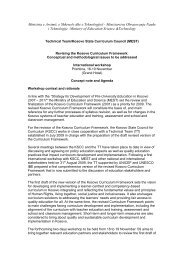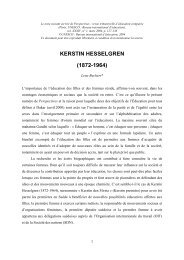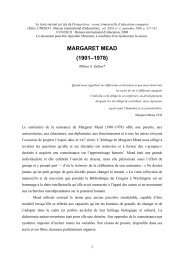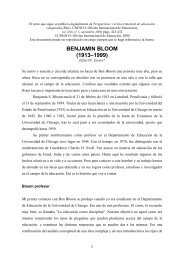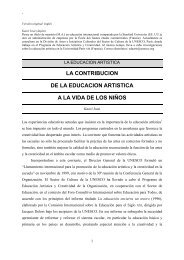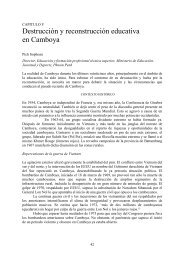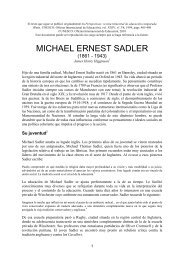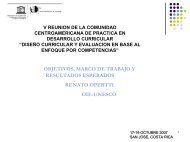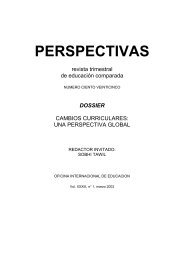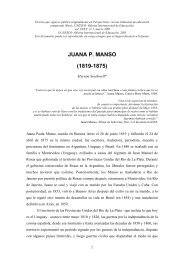MISKAWAYH - International Bureau of Education - Unesco
MISKAWAYH - International Bureau of Education - Unesco
MISKAWAYH - International Bureau of Education - Unesco
You also want an ePaper? Increase the reach of your titles
YUMPU automatically turns print PDFs into web optimized ePapers that Google loves.
The book Tahdhib al-akhlaq is considered the most famous book <strong>of</strong> Miskawayh; so this is the<br />
work <strong>of</strong> which we shall examine the contents quite carefully, so as to base on it our presentation<br />
<strong>of</strong> Miskawayh’s remarks on the education <strong>of</strong> young boys, only. For the work contains, in<br />
general, the majority <strong>of</strong> opinions which he introduced in this subject, although he did aim for a<br />
basis to acquaint the reader with the way to reach the supreme happiness. Maybe this tendency<br />
<strong>of</strong> his can be considered an effective translation, or a practical application, <strong>of</strong> the views he<br />
embraced, such as ‘seeing comes before action’ 10 i.e. knowledge precedes action. For if the<br />
reader knows moral happiness, and is influenced by the contents <strong>of</strong> the book, all his actions will<br />
be fine, according to his interpretation. Hence it can be said that Miskawayh’s book prepares the<br />
way for anyone who examines its contents to reach supreme happiness. So it is not possible to<br />
separate the learner’s personality and character from the science he learns, and the aim and<br />
objective for which he is striving to learn it. 11<br />
The second maqala (section) <strong>of</strong> the seven in the book discusses character, humanity, and<br />
the method <strong>of</strong> training young men and boys. This is preceded in the first maqala by a discussion<br />
<strong>of</strong> the soul and its virtues. This all amounts to a general introduction, which needed to be<br />
presented because <strong>of</strong> the prevailing opinion in Miskawayh’s day, where psychological studies<br />
took precedence over any other philosophical subject. This was like an obligatory introduction<br />
to every philosophical study.<br />
This ‘moral happiness’ was the happiness enabling the human being to live happily, in<br />
accordance with the requirements <strong>of</strong> virtue. Thus it was a personal happiness which the human<br />
being could reach through intellectual effort, and striving to acquire the sciences which would<br />
make his thought inclusive <strong>of</strong> all the areas and all existent beings, and make him free himself<br />
from material things so as to reach the degree <strong>of</strong> wisdom whereby to grasp human perfection.<br />
The knowledgeable one who reaches this degree <strong>of</strong> supreme happiness is, in Miskawayh’s<br />
opinion, called ‘the one completely happy’, and the pleasure he attains, in this case, is an<br />
intellectual pleasure. 12<br />
Miskawayh mentions supreme happiness in the third maqala <strong>of</strong> Tahdhib al-akhlaq, and<br />
gives a detailed account <strong>of</strong> it in order to attract the attention <strong>of</strong> one who does not know it, so that<br />
he will seek it and will be seized by the desire to reach it. 13<br />
After this Miskawayh sets out to clarify the various kinds <strong>of</strong> happiness and its virtues,<br />
which the human being is able to approach, and to live happily in this world following the<br />
requirements <strong>of</strong> virtue, in his view. To realize this, he cites a number <strong>of</strong> conditions, some<br />
internal and some external. Among internal conditions, which influence the rational state <strong>of</strong> the<br />
human being and his moral direction towards good or bad, are conditions within his own body,<br />
in respect <strong>of</strong> his enjoyment <strong>of</strong> health and moderate temperament. Other conditions are external<br />
to the human body, and help him to rise above shortcomings, and to love good for others, to<br />
include friends, children, and wealth. For love <strong>of</strong> others, and affection towards them, can play a<br />
part in the progress and upward movement <strong>of</strong> all people; that is because these are a sphere for<br />
fulfilling the different virtues. In addition, there are conditions in the environment surrounding<br />
the human being, inasmuch as human society is one <strong>of</strong> the basic conditions <strong>of</strong> reaching supreme<br />
happiness. The human being can only fulfil his perfection if it is affirmed that he is a social<br />
being, as well as being rational.<br />
As a result <strong>of</strong> human beings living together with others, and being in contact with them,<br />
their experience is enriched and virtues are rooted in their soul by way <strong>of</strong> putting these virtues<br />
into practice.<br />
The importance <strong>of</strong> transactions with people, as Miskawayh says, refers to the fact that<br />
transactions lead to the appearance <strong>of</strong> virtues which only do so in company and in dealings and<br />
interaction with others, such as integrity, courage, and generosity. If the person did not live in<br />
this human milieu, these virtues would not be apparent, and the human being would become just<br />
like people frozen or dead. Miskawayh repeats in several places that it is for this reason the wise<br />
3



